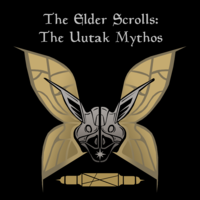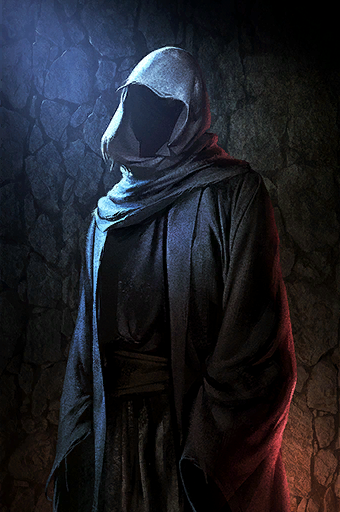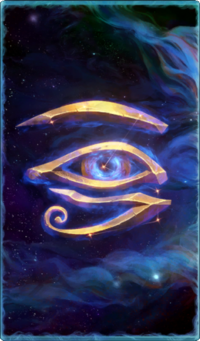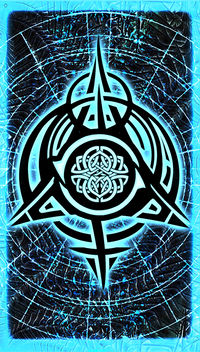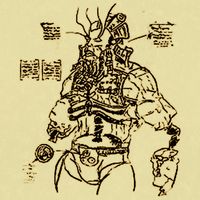General:Uutak Mythos/Musings Upon the Amaranthine Thought
- “This is Yneslea, kith. This is the East. Your western gods don't hold much sway here, and its best you don't forget that.” — Aldora Mothril (also known as Aldora the Daring)
Musings Upon the Amaranthine Thought is a central text that helps to clarify some of the more obtuse and esoteric background themes/lore of the Elder Scrolls discussed within the community, with many of these having originated from pieces of Unofficial Lore. The Uutak Mythos embraces the majority of these concepts, while also keeping the nature of their writing and message in clear mind, in order to elaborate on and discuss them within the frameworks of the Elder Scrolls universe itself without the project overstepping itself. Musings Upon the Amaranthine Thought itself is written from an in-universe perspective, similar to The Emperor's Guide to Yneslea, by a faction of mysterious scholars who are entranced by apocalypticism and those who are "doom-driven" (unable to be controlled by fate, and therefore, free to shape their own destiny however they see fit). Perhaps these "Prisoner Cultists" aren't so wrong in their beliefs as many others claim, but...maybe we shall never know. But do remember: maybe is, has, and always will be, a very powerful word. And words are power in the world of the Elder Scrolls.
If one wishes to read more about some of the concepts included in this page, please check out some of the following:
- Tower Lore
- The Psijic Endeavor
- The Thirty-Six Lessons of Vivec
- C0DA
- The Nu-Mantia Intercept
- Black Book: Waking Dreams
- The Monomyth
- Discourse Amaranthine
- Hero Lore
- The Truth in Sequence
- ...the Tower
- Vehk's Teachings
- Et'Ada, Eight Aedra, Eat the Dreamer
Note: This work of fiction was heavily based off of another religious analysis, which served to inspire this TES recreation of it.
The Sacred Teachings of the Prisoner Cults[edit]
Herein lies the pages of the elusive work of literature known as the Musings Upon the Amaranthine Thought, which is considered to be troublesome and problematic to the various "orthodox" religions of the civilized races of Nirn. If you value your usual teachings and simpleminded sanity, I suggest you put this book down and go read any of the other incredible books that can be found within the grand libraries of the United Explorers of Scholarly Pursuit; if not, you have been warned.
- Musings Upon the Amaranthine Thought: On Existential Discourse and the Unravelment of Doom
- Written by Anonymous
- A treatise on the nature of eastern philosophies, and their reverence for the Supreme Being known as the “All”, more devoutly called “God”, or what Westerners have come to call the “Godhead”, as written from the perspective of an Eastern philosopher. Considered (and often cited to be) one of the fabled writings that make up what is called the Nirnian Fragments: an indecisive and splintered collection of unorthodox writings deemed dangerously heretical by the Imperial Cult due to its association with the underground Prisoner Cult, a doomsday group associated with the “figures unbound by fate” who play key roles in the prophecies of the Elder Scrolls. This tome in particular was written by a Prisoner Cultist well-learned in the Marukhati, Nibenese, Psijic, Dwemeri, Dunmeri, Nordic, Argonian, Echmeri, and Akaviri ways of thinking. Translated by the archivists of the Imperial Library, Scenarist Guild, and the United Explorers of Scholarly Pursuits.
To the philosophical scholar who studies the roots of mythohistory and humanity (and by humanity, one means beings capable of self-reflection and independent thought, not just the myriad of species that exist underneath the common term of ‘man’), the most significant and important aspect of the current, fantastical kalpa is, without question, the revival of Amaranthine Thought, or what Westerners would call “Eastern Philosophy” out of ignorance and a hatred for the blasphemous. The mythical importance of this event is undeniably due to the unusual extension of this current kalpa, perhaps due to the machinations of the Original Spirits (or to be more specific, the Dragon God whose birth shattered the Dawn, and his Names, into the new eternity), more than an actual increase in love and study for this often-considered esoteric school of thought in and of itself. For as the Aurbis continues on without pausetime—truly everlasting into itself as its birth-twin rots at the seams—does the sapient mind choose the moment wherein to become, to all appearance, irrevocably set on the contrasting ideals considered treasonous by their own gods: the idealism of immaterialism.
However, as humanity proves to be ever deceptive of its own nature, does it continue—in large parts—to focus on and be swayed by the erotic mysteries of the material, as demonstrated by the malicious teachings of He Whose Perch Allowed the Day, and his brethren, in order to provide a false sense of peace and achievement on such a cold, barren world. Thus, is the Eastern Philosophy (or what I would, more personally, refer to as “Lorkhanism”, as it was his Heart-Wound that gave the East the freedom to live), even in this current bend of the world-river, fragmented and persecuted by the ever rigid and demonizing West. But it was these persecutions of “those who renounced the day” that allowed them to, wholeheartedly, recognize the unity of nature and harmonize with the higher levels of the consciousness, and have bestowed upon them the beauty of the immaterial world through the harshness of the physical.
The phrase “It is within the heavens that Magnus sets upon the death of the world, only to rise again upon its rebirth” has as much significance in the material as it does in the immaterial. And while the prevalence of Amaranthine Thought, and thus immaterialism, means the eventual death of materialistic concern within the East, it’s practice and growing influence has led to the restoration of physical consciousness in the Eastern Lands.
History (mythical and mundane) has shown us that followers of Lorkhanism have always encouraged burying away older faiths and social dogma in order to ascend to newer and higher levels of spiritual purification. Hence, do Easterners have confidence that the true spirit of humanity – which is ascension into the immaterial, and therefore, complete and utter Oneness with God – being (as we well know) both mundane and divine, will in its own time, rebel against the harmful sentiments towards materialism generated by the West, and be built in the shape of God in its act of unholy and righteous rebellion that will lead to utmost destruction.
The significance of this upcoming rebellion is enhanced by the facts, first, that within this current kalpa Amaranthine Thought has entered a prominence which it has not known (perhaps never known) since the moment Lorkhan looked upon the Wheel, the Aurbis, from its side and discovered the Universal Truth: I AM; secondly, that the growth of eastern philosophy has been at the center of and played a part in every great religious renaissance this broken world has seen. Lorkhanism—the earliest formulation, of which, for the West, began with the foundation of the Psijic Order and their Old Ways (or, more secretly, with the Dwemer and their schism with their brethren that left eternal scars in the fabric of existence)—lies at the heart of almost every faith found within both the East and West (the Velothi and Old Nordic religions being chief among them), being alike and intended as vessels for and expressions of it, although that remains a fact only recognized by an enlightened few.
The infamous monotheocracy founded by the Prophet Marukh known as the Alessian Order in the First Era, perhaps unknowingly to itself, was also founded on Eastern principles. The Order had been a strenuous, narcissistic, egocentric, and barely sustained endeavor to rescue the Western faith from polytheistic and Aldmeri (which often tend to be Anuic, and therefore foolish, teachings) ideals, and install sacerdotalism by removing grossly materialistic and idolatrous taint that detracted from knowing God. The Marukhati Selectives, an introspective sect of that Order, were even more robust and eccentric in their Lorkhanism, to the point they broke the day in their efforts to make the Dragon more akin to God.
Considering that the Alessian Order was eventually destroyed and its influence subsequently wiped away from the land, causing Tamriel to descend rapidly back into a more traditional Western outlook that resulted in centuries of war, famine, and decay, clearly demonstrates how the West was not yet ready to accept Lorkhanism and a higher level of reasoning. However, in this current day and age, it seems that perhaps Amaranthine Thought could have a revival in the West and achieve a permanence it has never had there before, although this humble sage believes such a thing to be impossible.
And now with these remarks on how Amaranthine Thought has begun to grow in importance throughout the world, we shall proceed to give a rough, general explanation on the nature of the school of heretical, immaterial thought that lies in the minds of all humanity and, yes, even the gods themselves, but only treasured in Eastern philosophy.
First, we must start with the belief that from Nothing comes Everything, and recognizing true conscious as the indisputable and indestructible condition of existence, the essence of immaterialism (I AM NOT), with little resistance to that logic and deriving all things to be impure and false within the absence of true Being (which is Becoming God, or AMARANTH), which is metaphor-made-manifest and untraditional materialism, but in its infinite multitudes possesses and exercises ones’ ultimate potential in being both reality-made-manifest and the Universal Truth—being, rather than having, life, substance, and mind, comprised in the utterance of two words, I AM, and ascending the current universe by becoming its’ new, glorious manifestation. Therefore, if the Universal Truth is I AM and the essence of immaterialism is I AM NOT, then the underlying goal of all true followers of Lorkhanism and Amaranthine Thought is the state of being I AM AND I AM NOT, or being so immaterialistic that they completely make up the material, what most refer to as the AMARANTH of which Eastern Philosophy gets its name.
With the above in mind, we must then pay heed to the school of Amaranthine Thought that all consciousness exists as subgradients of the true conscious, and thus is materialistic life and the consciousness of the individual merely unconscious thoughts generated by God, and are therefore, illusion. The myriad forms of being that exist within the Aurbis (which consists of water, air, plants, minerals, magic, humans, animals, daemons, spirits, and even gods) are deviations, or unconscious expressions, imposed by reality and made into reality by the true or absolute consciousness, which is the will of God. And whereas all subgradient conscious descends from the true conscious, so must all subgradients return to the original gradience that is God, for all unconscious illusions have the potential to become conscious reality.
Herein lies the secret of transcendence, or what the Velothi deemed the “Psijic Endeavor” and the Dwemer named “evolution”, which is with all integrity nothing more than the expression of the tendency for all things to revert, by divine ascension, back into its original condition—God. Therefore, is it trivial to concern ones’ self with materialistic matters, especially societal and social structures, as no form of life is below or above the other on the material plane, as all things are on a fundamental level the same, being mere extensions of God’s Infinite Being. For Westerners, this would help to explain why AMARANTH is often equated to being a Dream (as our reality, the Aurbis, is an illusion fabricated by the All that is God), and why Eastern loyalists are often branded as blasphemous, backwards, and morally upsetting due to our belief that becoming too attached to the material or materialistic concerns is turning one’s back on the Godhead.
But even for followers of Lorkhanism and Amaranthine Thought the road to AMARANTH is a difficult, and potentially self-destructive, one; for in the pursuit of being I AM AND I AM NOT, in becoming the immaterial that generates the material, in becoming God, one can strive to be so immaterial that they completely and utterly wipe themselves from God’s Being—this we refer to as ZERO-SUM (or NUMINATION), we Lorkhanites, and it is regarded as a terrible sin, for what is a greater evil than being smitten from the thoughts of the All that is God? The Dwemer came close to this fate, in their slight derivation in Amaranthine Thought (which consisted that it was them, and only them, that had the potential to become God, and that in order to become Him, they had to remove Him), and now exist in a half-life, as a testimony to God’s Wrath and will return as His Anger when God grows weary of His Rotting World.
In order to avoid NUMINATION, or the Near-Error of the Dwemer (which could be better explained as the phrase I REFUSE), one must truly achieve the Realization (which is I AM AND ALL ARE WE), succumb to the inner peace that they exist only in the true conscious of God and truly have no conscious and materialistic body of their own, for they are everything and everything is them, and continue to exist in permanence despite of it for while not being one with God, they are a part of God. In the lands of the Velothi this realization was related with CHIM, the Ehlnofex word for Royalty, which means to exist externally and independently of and yet still be internally within and dependent on God, and therefore being Known to God.
“They need not to be manifested by God, for they now exist eternally besides God, and know that they are the One, who is not made or generated, but simply is and always will be, and by making all things appear He appears in all and by all, but especially in those who now manifest themselves independently of Him, knowing that they are Him, and making His Will their Will. The Essence of All is One.”
With CHIM comes, as a corollary, the law of correspondence between all planes, or spheres, of existence, in virtue of which the divine is the mundane, the machine is the organism, the universal is the individual, the world is humanity, and humanity is God. “The earthly mortal is a mortal god, and the heavenly god is divine mortality.” Without knowing I AM AND ALL ARE WE, the state of AMARANTH is unattainable, for by lacking this higher intelligence, or spiritual consciousness, one is not yet human, and only has the potential to be truly human, as they do not Know or are Known by God. CHIM, like all facets of Lorkhanism and Amaranthine Thought, also avoids the Western obsession with anthropomorphism, which is defining godhood to be the cause of life, thought, and substance, instead of the effect of being life, thought, and substance. Those with CHIM, or those who have the clear potential to attain it, are referred to as “Ruling Kings, due to that word’s ancient ties with Royalty.
Ignorance of God is thus one of the greatest evils in Eastern Philosophy, but God is not to be discerned in phenomena or with the outer eye. The journey must be made within ones’ self for ones’ self. In order to know we must be, to such a degree that as the Ruling King gains spiritual conscious on the path to true conscious he becomes an orchestra of universal knowledge, capable of obtaining all truth, even the Universal Truth; and from once being incapable of knowledge due to having material consciousness, gains spiritual consciousness and the knowledge of himself and God, which is the substantial identity that exists of and between the two. For the ultimate desire of a Ruling King, which is the ultimate divine revelation, is knowing how to define himself within and without the scope of God, and gaining the supremacy of moral law—of being beyond the concepts of good and evil, for he is both good and evil, and is yet God, who is incapable of being good or evil for He simply IS.
While Westerners would argue that CHIM, and therefore AMARANTH, is achieved through perfection, the true method on which Ruling Kings become able to say I AM AND ALL ARE WE is purity. Not merely having, but being, consciousness to the point of having full perception of God just as God has full perception of them, as Lorkhanic texts dictate. In the same proportion, a Ruling King has power. Those with CHIM are metaphors made manifest, mortals of great power, and can work in the Aurbis what seem to be miracles by application of their will alone. But the secret to their power is purity, as their only motive is love. For the power with which Ruling Kings operate is spirit, and spirit is keen and mighty in proportion to its purity, and absolute spiritual purity is God. Hence the miracles of the metaphor, as distinguished from the mage or the god, are really worked by God—the God in and of the true mortal that is the Ruling King, for they are the codas bolstering the catastrophic musical that is our mortallic persistence.
A word on the orchestra of Amaranthine Thought: this is emphatically the part of the mind that is called the intuition. Following this in its doom-driven course, humanity comes into such relations with its own essential and permanent self—the soul—as to be able to receive from her the knowledges she has acquired in the long ages of her past (for the soul, in Amaranthine Thought, is and should be constantly reborn into a physical body throughout its existence; the death of the physical form does not damage the soul, but the stagnation of the soul without a physical form damages the inevitable body that is to come). This implies no disparagement to the mind’s other and centrifugal part, the intellect. This also must be developed and trained to the utmost, as the complement, supplement, and indispensable mate to the intuition: the man to his woman.
Purifying and combining these two allows the human to know all things and ponder upon himself. For he knows the Godhead, and to know the Godhead is to have, and to be, the Godhead, and “the gift of the Godhead is eternal life, or what the Time God covets selfishly as Glamoril.” This is the AMARANTH of which Amaranthine Thought and Lorkhanism, of which Eastern Philosophy, holds so dear. I AM AND I AM NOT.
In conclusion, all of history—in this current existence and perhaps the previous ones—shows that with the restoration of Amaranthine Thought comes the greatest triumph of the modern Aurbis: the triumph of free thought, a thought that is, which has dared to probe the consciousness in all directions, outwards and downwards to matter and phenomena, and inwards and upwards to spirit and reality, and exists because it has the right to exist; it represents also the impending requiem, the new AMARANTH: for in God is All and in All is Being, for is Nature and Life the vessels for God’s manifestation, and for in the Soul lies the potential to becoming the Individualization of God.
However, perhaps next time when I commit to pen, I shall speak of the “God-like Phenomenon” that even those who wear the mantle of CHIM as Ruling Kings pale in comparison to. For while I AM AND I AM NOT is required for the harsh, difficult path to becoming One with God, there are entities that do not notice or care to attain this closeness to the Enigmatic Godhead, in which they on some supergradient of power and mystery exist outside of the Wheel but lie confined within the Tower of God.
I, of course, speak now on the Dwemeri Remnant known as the Anumidium (I AM BUT GOD IS NOT, or NO), the shadow-mythic figure that stalks the pages of every cultural narrative formally recognized by the Dark Elves as the Sharmat (I AM AND ALL THERE IS, or YES), and the latter’s existential-twin that writes the pages of the Elder Scrolls themselves in their self-driven but self-doubting journeys, the Prisoner (I MAY AND I MAY NOT, or MAYBE).
But such intriguing entities, no matter how intoxicating their auras be, are a subject for another time. I shall not speak of them here.
